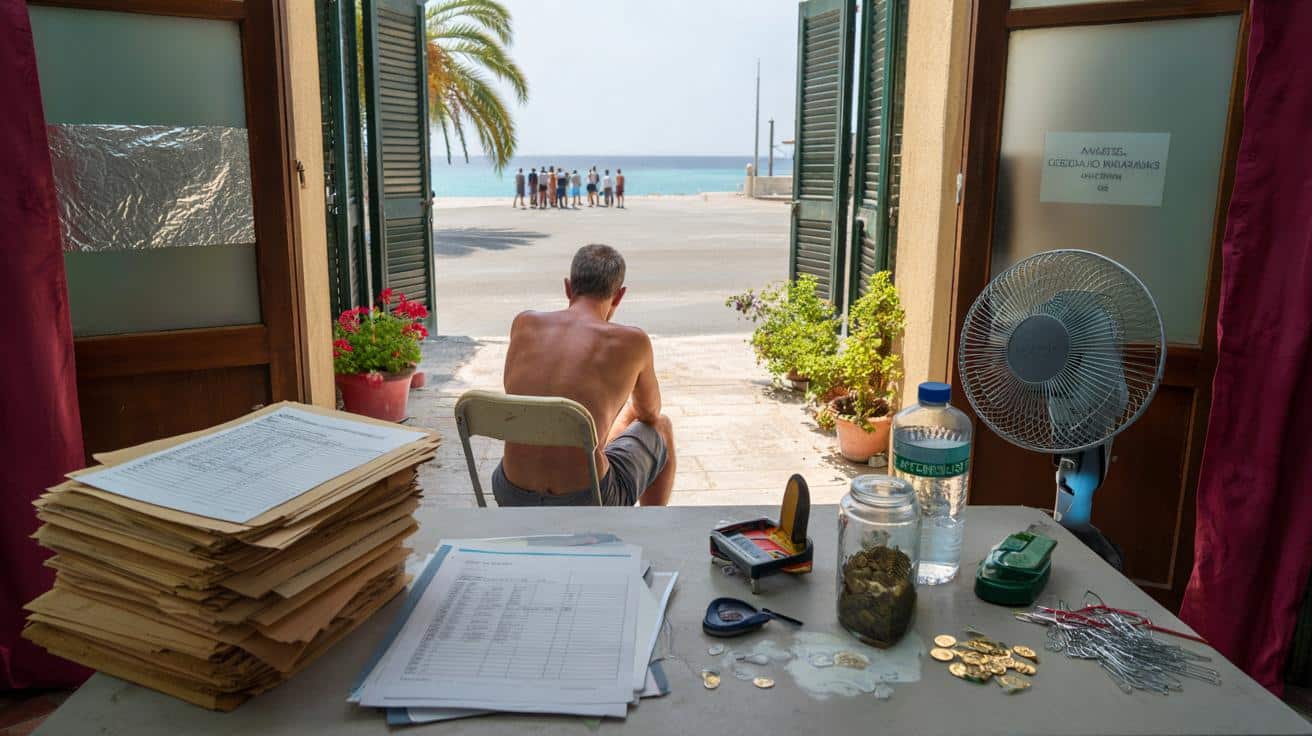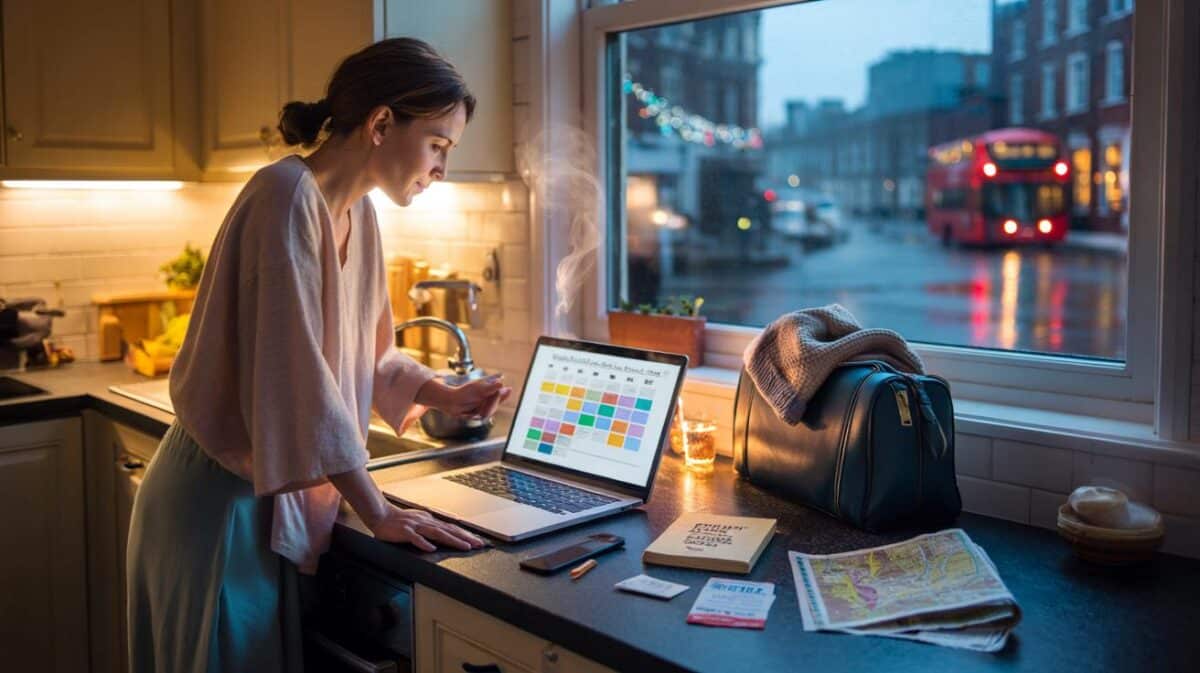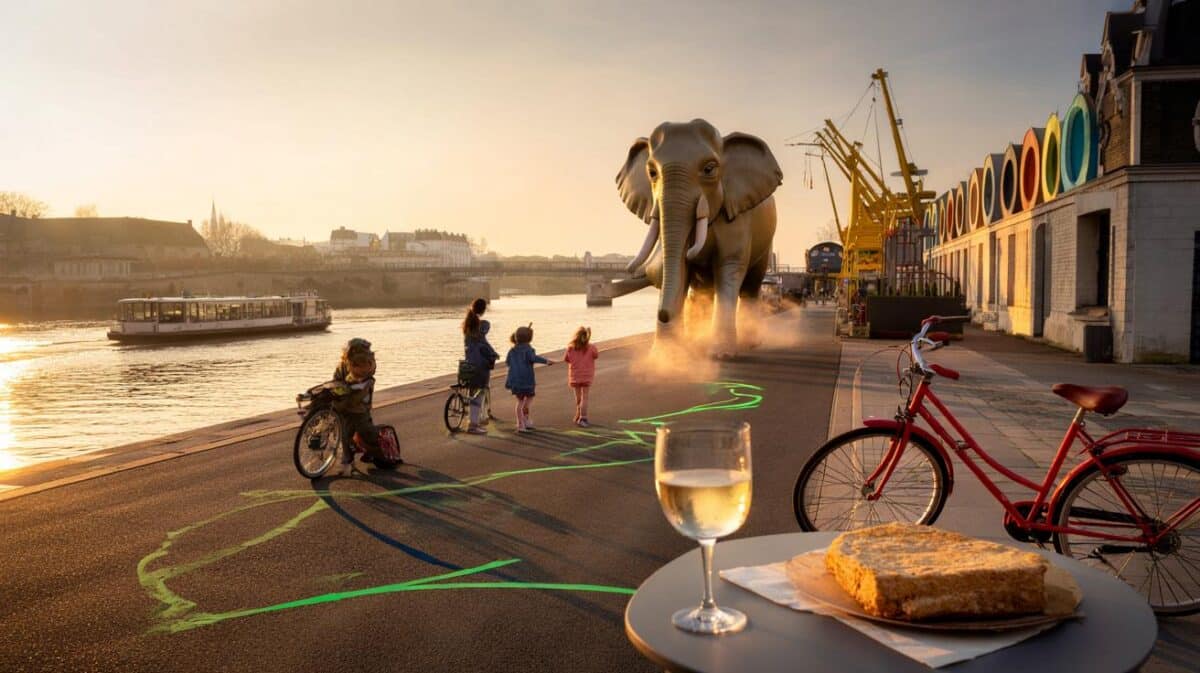I moved south to trade drizzle for daylight, rent for fresh tomatoes, and the 7:42 to Waterloo for the sea. The promise was simple: peace, sun, savings. Reality came with forms, queues, heat that stuck to my skin, and evenings that rang hollow.
The air smelt of orange peel and diesel, and the plaza hummed with the lazy clink of cups. My suitcase wheels snagged on cobbles as if to ask, sure about this?
By noon I had keys, by three I’d dragged a chair to the balcony and let the afternoon peel itself open. A neighbour watered geraniums with a hose that sighed like an old dog. Then the first email landed from the estate agent: I’d need four numbers, two certificates and a specific appointment that didn’t seem to exist.
I closed the laptop and watched a palm sway with intent. Something heavy turned in my stomach. It was not hunger.
And yet I stayed.
The dream, and the drag
I thought a smaller life would be simpler. Sunlight on white walls. Groceries paid in coins. Afternoons that slowed to a syrupy drip. Instead I found the two-speed reality of moving abroad: mornings spent at municipal counters under flickering lights, nights scrolling WhatsApp for a friend to drink a beer with.
On my second week I queued for a tax number with forty others, each of us clutching the wrong document like a talisman. The security guard handed out tickets that skipped numbers for no reason I could decode. A woman in front of me whispered that she’d been three times already. When I finally hit the desk, the clerk stapled my photocopies, looked up and smiled as if to say, welcome to the game.
It wasn’t just the paperwork. Heat rolled in like a wet towel by late June. My top-floor flat was an oven with views. Work calls turned into sweat management. I moved a fan like a pet from room to room. The saving on rent felt clever at first, then less so as my electricity bill yo-yoed and my social life thinned to an echo.
What heat doesn’t tell you
Afternoons teach you their own rules. Shutters down by eleven. Water in the freezer, bottles lined like soldiers. Errands done by ten or not at all. I learned to map the city by shade: the bakery’s narrow alley, the arcade by the pharmacy, the church that throws a cool patch at two fifteen.
One day, I tried to work through the hottest hour because a deadline didn’t care about the sun. By four I was a damp, grumpy rag. A neighbour knocked and wordlessly handed me a bowl of salmorejo and a roll of tin foil for the bedroom window. She nodded at my fan with that pity reserved for bad plans. I slept, and woke at seven feeling human.
Heat drains your social appetite. I found myself declining invitations because walking five blocks felt like a marathon. People disappear between one and seven, swallowed by shutters and naps. **Peace turns into silence that’s too soft to lean on.** You start talking to the lizard sunning itself on the terrace wall. It doesn’t answer.
Bureaucracy is a lifestyle, not a task
In London, admin means an afternoon and a coffee. Here, it became a season. Documents needed other documents; appointments needed codes sent by post; translations demanded stamps that only lived in a small office across town open for 90 minutes on Wednesdays. I bought a folder and fed it like a pet.
There was the bank account that wouldn’t open without a certificate from the town hall, which I couldn’t get without the bank account. There was the phone contract that paused because my passport number had a letter. I grew familiar with phrases like “cita previa” and the resigned shrug of people who know the rules better than the goal.
Friends messaged me photos of pub gardens and told me I was brave. It didn’t feel brave at the tax office. It felt like learning to ride a bike in a busy car park. You wobble, you clip a wing mirror, you start again. The small win of a stamped page glows briefly, then another email lands with a fresh acronym. *Peace began to look like a paperwork-free Tuesday.*
How I stopped spiralling
What saved me wasn’t a grand fix but a script. Three actions each morning, before the sun climbed: one admin step, one human contact, one treat. Print the form. Say hello to the baker and ask two clumsy questions in the local tongue. Sit with coffee and watch children kick a ball. Then back home, shutters down, laptop open. Repeat.
Loneliness hates structure but respects rhythm. I made myself a list of third places: the municipal pool at eight, the library’s cool tables at nine, the small market where the fishmonger calls everyone “amor.” I joined a running group and never ran, but I walked beside them with a bottle and handed out oranges. Let’s be honest: nobody really does that every day.
**The other trick was lowering the bar for friendship.** Instead of hunting a soulmate, I collected micro-rituals with strangers: a wave to the man who hoses the pavement, a shared bench with an old couple who gossip about pigeons.
“You can’t outsource belonging,” an expat social worker told me over iced coffee. “You build it like compost — slow, messy, daily.”
- Book fixers when it matters: visa, property, anything with stamps.
- Trial your life in the shoulder months, not just May and June.
- Budget for an air-con unit and for days you can’t think straight.
- Start language classes at week one, even if you speak like a toaster.
- Design a heat routine you can keep when you’re tired and lonely.
Smart moves I wish I’d made earlier
Do a 90-day dress rehearsal in the worst season, not the best. Come in late August when heat wraps the city like clingfilm. Come in January when the damp sneaks into your bones. Keep a log: what things cost, how long simple tasks take, how your mood shifts by hour. **Your diary will tell you whether your fantasy has legs.**
Find a fixer with receipts. Not the Facebook hero with a smiley logo, the one locals rate quietly. Ask for a written scope, a timeline, and what fails most often. Make duplicates of everything: passport, rental contract, insurance, bank letters. Store digital copies in two places. Use email threads with clear subjects so you, and they, can see the path when it bends.
Think in micro-budgets. AC for two rooms, blackout blinds, a desk fan that’s actually quiet. Cold food you can make when the kitchen feels like a kiln. A taxi line for days the pavement shimmers. Build a community like you’d build cardio: five minutes, then seven, then ten. Introduce yourself to your future boredom and give it a toy. A library card counts.
What living here has taught me
I wanted serenity, a fatty sun, a lean bank balance. I have those on certain Tuesdays. On others I have a stamp that took three trips, and a neighbour who leaves figs by my door. The city doesn’t solve your life. It invites it to change shape.
We’ve all had that moment when you look up from a new life and think, this hurts more than it should. Heat, paperwork, quiet — they conspire. Then a small thing happens, and the day click-shifts. A shared lift with a stranger and their shopping. A laugh in the wrong language that still lands.
**If you’re plotting your escape to warmer air, make space for friction.** It’s not a failure of the dream. It’s part of the terrain. The trick is to build a life that bends with the climate and the calendar, so when August comes and the plaza empties, you know where to stand in the shade — and who to call when the fan dies at midnight.
| Point clé | Détail | Intérêt pour le lecteur |
|---|---|---|
| Test before you leap | 90-day trial in the toughest months with a cost/mood log | Reduces regret and filters fantasy from fit |
| Design a heat routine | Shutters, shade-mapping, cool food, micro-budgets for AC | Makes summers livable without blowing savings |
| Build belonging slowly | Third places, micro-rituals, one daily contact | Cuts loneliness and grows a real social root system |
FAQ :
- Is bureaucracy really that bad, or did you get unlucky?It’s sticky by design. Some days glide. Others knot up because a signature is missing or an office closes early. A fixer and a folder of duplicates turn chaos into a queue.
- How much did heat change your actual costs?My summer electricity bills ran roughly 30–50% higher than in spring, mainly from AC and longer fridge cycles. The saving on rent still won, but it wasn’t the slam-dunk I’d imagined.
- Did learning the language actually help with admin?Yes. Even bad grammar softens doors. Clerks meet you halfway when you meet them a quarter of the way. A simple greeting and patience beat fluent sighing.
- How did you make friends without expat-only circles?I layered both. A language class, a community garden, and one hobby group built bridges. The goal wasn’t a best mate by Friday. It was three faces that smiled when I walked in.
- Would you move again knowing all this?I would, differently. I’d trial the hard months, budget for heat, and start smaller. The sun still changes my mood. The paperwork no longer owns it.









The bit about “build belonging like compost” resonates. I moved to Valencia; turns out micro-rituals (hello to the panadero, same bench at dusk) kept me sane. Thank you for naming the lonliness I couldn’t spell.
Hot take: you traded rent for electricity bills—net zero? Are we romanticizing the sun while ignoring income volatility and hidden admin costs?